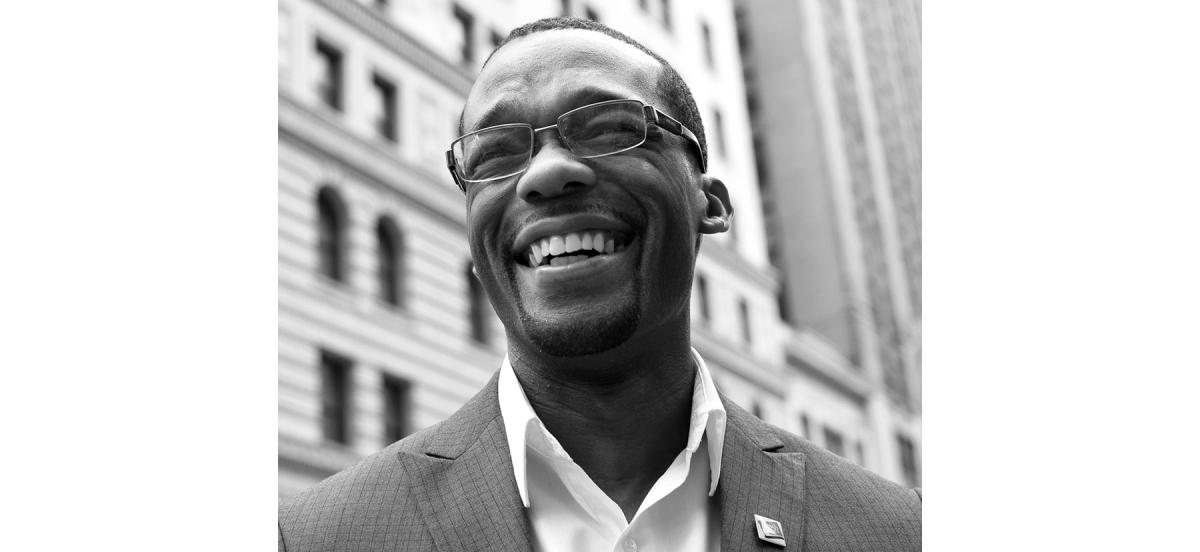Johnny Perez is Haverford’s Fall 2021 Friend in Residence

Johnny Perez gave a talk, "Contemporary Issues in Prison Abolition," at Family and Friends Weekend. Photo courtesy of Allegra Abramo.
Details
The organizer and activist visited Haverford to discuss his work in prison abolition and criminal justice reform.
Johnny Perez, an activist working towards prison abolition and criminal justice reform, was this semester’s Friend in Residence. Having been involved with the criminal justice system for over 13 years, Perez is the director of the U.S. Prisons Program for the National Religious Campaign Against Torture. Perez had the unique distinction of not only being the first on-campus, in-person Friend in Residence since Nozizwe Madlala-Routledge in spring 2020, but he was also the first to not be directly associated with the Religious Society of Friends.
“Our original arrangement was to bring Quaker abolitionist and social justice activist Laura Magnani to campus, and she planned to invite Johnny as a guest speaker to a number of her events,” said Director of Quaker Affairs Walter Hjelt Sullivan. “When Laura confronted some significant family health problems and had to withdraw from the program, we were very fortunate that Johnny, a highly qualified expert in the field in his own right, was already engaged and willing to step forward as the primary presenter.”
Sullivan additionally noted the importance of bringing Perez to campus in-person this fall, after the pandemic’s restrictions.
“Quakerism is an experiential faith, not fully understandable from reading historical documents, academic papers, or even famous Quaker writings,” he said. “Similarly, activism is more of an art than a science. In person, one can gain a fuller, more subtle sense of the lived experience of practicing the Quaker way or carrying the weight of a concern for social justice.”
Perez’s work exemplifies that concern for social justice. He is a leader of the Unlock the Box Campaign, a national movement to end solitary confinement, and a member of the Board of Directors of the Juvenile Law Center and the Urban Justice Center, nonprofit public interest law firms representing underserved people. His work has continued with the Urban Institute’s Prison Research and Innovation Initiative, an organization focusing on substantial prison reform in favor of human rights.
Perez’s campus residency included visits to classrooms at Haverford and Bryn Mawr, as well as a public presentation, “Contemporary Issues in Prison Abolition,” on Saturday, October 30, as part of Family and Friends Weekend. In this presentation, he focused on the most inhumane aspects of incarceration, including solitary confinement.
“The folks who benefit most from an unequal system are also morally responsible for abolishing it. Haverford is developing leaders who will guide the next generation of policy changes of the United States,” Perez said. “This is at a time when our democracy has not only been threatened, but continues to stray away from our collective values of love, compassion, and second chances.”
Perez additionally noted that his time in direct involvement with the prison system has opened his eyes to the absolute need for reform.
“The one thing that prison taught me is that the people most harmed and are closest to the problem, are also closest to the solution,'' he said. “Having served time in solitary and in prison places me in a unique role to connect how a policy or law would work in theory, versus in actual practice.”
Haverford’s Friend in Residence Program is an initiative of the Quaker Affairs Office. Though Perez is not a member of the Religious Society of Friends, both he and the Quakers became associated with the criminal justice reform movement due to their personal religious foundations.
“Like Johnny, Quakerism's engagement with prison reform and work for abolition started from within,” said Sullivan. “Some historians estimate that as many as 15,000 Quakers were imprisoned for challenging the religious order of the day in early 17th-century England. Today, prison reform and abolition work is championed by many Quaker individuals, meetings, and yearly meetings. The Friends Committee on National Legislation lobbies against the death penalty and solitary confinement.”



